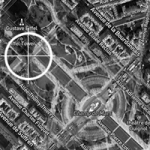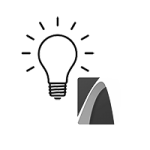Lighting
Lighting
Overview
Currently Enscape uses the lighting tools that are already available in Vectorworks. With Vectorworks, you simply add a native Vectorworks light and it will be displayed in the Enscape viewport (except for directional light).
The quickest and easiest way to open and start working with Vectorworks’ native lighting system is to click on the Visualization button and then the corresponding Lightbulb icon to reveal the light ‘types’.
When you click on one of the light types then the types corresponding dialog will open.

Vectorworks' Lighting options
The three main lights that are available in Vectorworks are:
- Point Lights – Emits light equally in all directions from a single point in space
- Spot Lights – Directs a narrow beam of light with Falloff
- Custom Lights – Allows control over all settings and also for use of IES lighting profiles
NOTE: Directional Lights are currently not supported by Enscape and are therefore not included in this article.
There are also two additional light types that need to be converted from an ‘object’ and therefore do not have a symbol. These are:
- Line Lights – Where a light emits from a line
- Area Lights – Where light is emitted from a surface of an object, so called emissive lighting.
Point, Spot, and Custom Light symbols in Vectorworks
Point Light
Point lights radiate light in all directions, like a bare light bulb.
Use the “Point Light Specs” to specify the Distance Falloff which sets how fast the light intensity falls off as you move away from the light.

Point Light in Scene
Spot Light
Spot lights work like a combination of Directional and Point lights. The light is projected in a specific direction, but is aimed at a specific object, like a flashlight.
Click to place the spot light, drag to specify the light direction/target, and then click again to set the spot light. Use the Look To Height parameter in the Object Info palette to set an exact height.
Once in place, you can only see the target handle and projection line when the spot light is selection. To move the light after it has been placed, or to adjust the target handle, use the Selection tool.
Select the “Spot Light Specs” to specify the angle of the beam/spread, and the Distance Falloff.

Spot Light dialog
NOTE: – Unlike Vectorworks, in Enscape there is a “cut off” of how far light from spotlights will travel, which was originally calibrated based on inside lights. So if you are using outside spotlights, you may need to increase the brightness in Vectorworks in order for them to show up as you want in Enscape.
Custom Light
With custom lights, you can adjust all parameters, and also load in additional light emission profile data from another file.
Select the “Custom Light Specs” to specify the parameters.

Custom Light dialog
Additional Light Types
If you are using Vectorworks, the following light types are also available
Line Lights – where light is emitted from a line, the converted object must be a line (2 point polygon) in the first place
Area Lights – where light is emitted from a surface of an object. This can be used to make objects Self Illuminating, such as a television. Select Modify -> Convert -> Convert to Area Light
Rectangular lights are easily placed with three clicks, the first click will define the target point and the second click defines the light length, the third click defines the light width. The direction that the light is being emitted is indicated by a small arrow that can be seen attached to the rectangular plane.

Convert to Line or Area Light
Moving/Theatrical Lights
As Vectorworks is popular with those creating renderings for the Entertainment industry, moving lights (or theatrical lights) are often used. At present, Enscape does not support animation, so these moving lights are not officially supported. However, there is a way to make this work. In Vectorworks, the light source is inside the casing of the mover and is defined as a 3D locus (basically reference points). As the moving light symbol is a solid, Enscape does not allow the light to pass through it, so you need to use the Vectorworks Push/Pull tool to extrude the lens of the light past the 3D locus which defines the light source in the Vectorworks Lighting Device Symbol.

Moving and Theatrical Lighting Control
Sunlight
Within Enscape, you can change the time of day by holding down shift + right mouse button and moving the mouse. As it gets darker outside, your internal lights will come on. Enscape does not store the time, so it will start at the default value each time you launch Enscape. What is great in Vectorworks, that isn´t possible in other CADs, is to set the sun in a particular position. You can find out more about these feature here.

